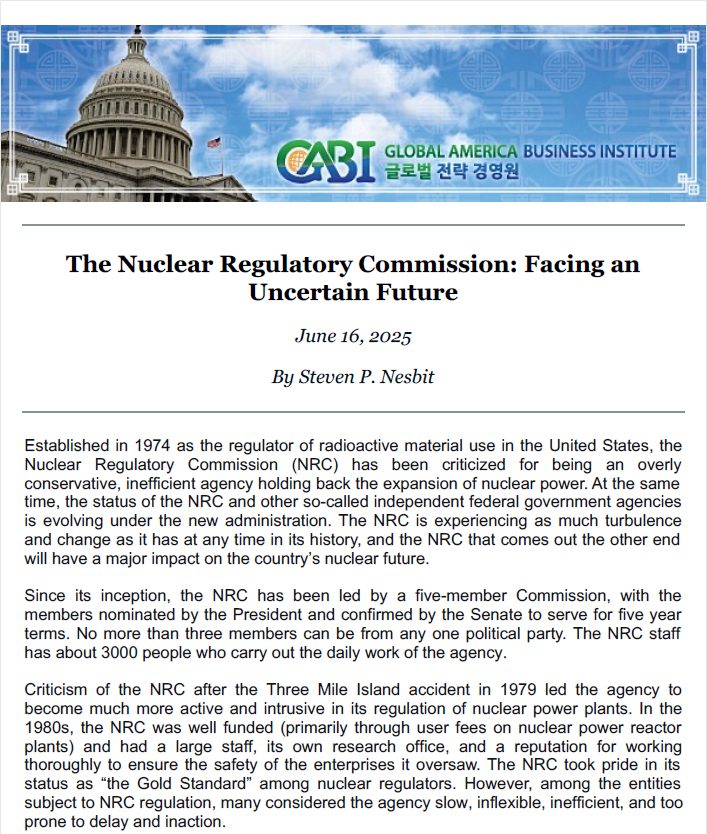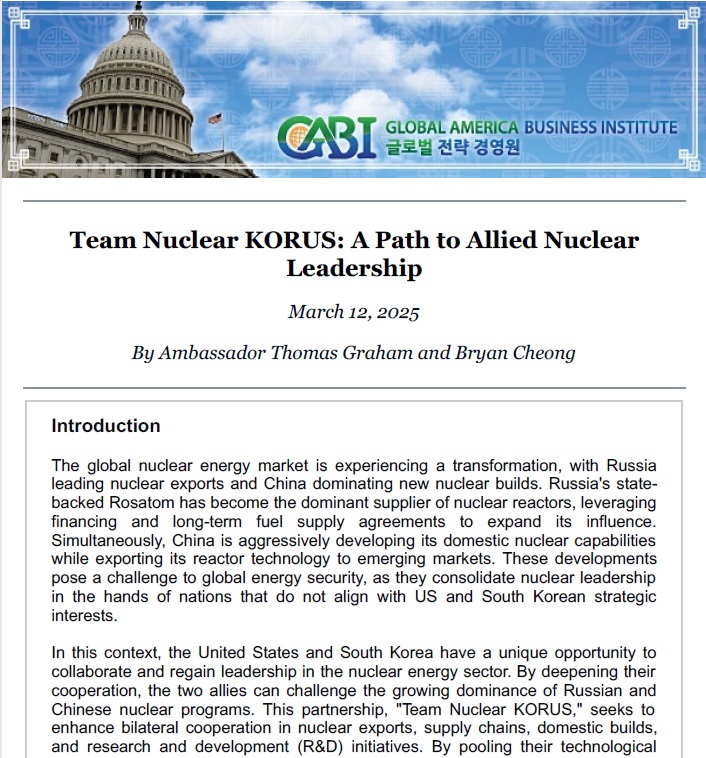Introduction
Many nuclear executives are cautiously optimistic that the new pro-business Trump Administration will stimulate the struggling nuclear energy sector. The S&P 500, for example, has just reached $20 trillion in market capitalization for the first time ever. The 10% increase in the S&P index in just the first three months after Trump won the election and represents a $2.7 trillion increase in corporate value for U.S. companies–and that’s before the Trump Administration has really gotten started. These are optimistic signs, but lingering questions for the nuclear sector are: “How much help will Trump provide to the nuclear industry?” and “How soon can the industry expect to feel it?”
This is a complex prediction, especially so soon into the new Trump Administration. Nevertheless, business owners must plan according to the information currently available.

Vogtle 3 & 4 Reactors courtesy of Georgia Power
Corporate Tax Reforms
One of the highest priority and largest potential impacts on nuclear energy from the Trump Administration involve corporate tax reform. In his 100-day action plan, Donald Trump pledged to:
- Reduce the corporate tax rate from 35 percent to 15 percent;
- Allow investments capital equipment to be written off immediately (i.e.,depreciated) instead of over time;
- Allow overseas profits to be repatriated for just a 10 percent tax; and
- Impose a new “border-adjusted tax system” (tariff) that would place a 20% tax on imported goods.
These reforms are now on the fast-track. In fact, the President has promised to announce a “phenomenal” tax reform proposal within the next few weeks. Republicans, who currently hold the majority of votes in Congress, also have expressed their intent to enact corporate tax reforms into law by Fall 2017. However, the 2600+ pages of U.S. tax law are complex, tax accounting methods are corporate specific, and the devil is always in the details:
Corporate Tax Rate Reduction to 15%
In general, the proposed reduction in the corporate tax rates to 15% should be a positive stimulus for the nuclear sector since it will increase the profit margins of domestic nuclear equipment vendors, nuclear service companies, fuel suppliers, and plant owners. The larger profit margins will help any struggling nuclear businesses stay afloat as well as allow successful businesses to expand their reach.
How much will the rate reduction impact the industry? Of the 34 countries in the OECD, the USA ranks highest with its 39.1 percent statutory corporate tax rate as compared to an OECD average of 24.1 percent. On its surface, the reduction from a 39.1 percent to just 15 percent sounds dramatic. In reality, the impact on large domestic nuclear corporations will likely not be as large as it appears. Presently, due to sophisticated tax accounting methods, very few large corporations actually pay the full 39.1 percent statutory tax rate. Thus, the Trump tax stimulus will have its largest beneficial impact on small to medium sized nuclear service companies, namely the LLCs, LLPs, and S-Corps whose income can be taxed at up to 47.2 percent as a pass-thru entity.
Additionally, the reduction in U.S. corporate tax rates to 15 percent is expected to encourage foreign nuclear companies to bring more nuclear jobs and investment capital to the U.S.. That may be great for the country overall by enlarging the overall domestic nuclear sector. However, it could also yield negative benefits to existing nuclear businesses who will see increased competition for their products and services.
Deductions
The overall decrease in corporate statutory tax rates is not the full picture either. There are speculations that Trump’s tax plan will also eliminate many existing tax deductions for corporate expenditures. There are even some speculations that Trump’s tax plan may entail a gross receipts tax which allows very few expenses to be deducted. This provision could be very unfavorable to nuclear companies with high amounts of gross revenues and high expenses. A nuclear company having a low net income or net losses, could find itself paying large federal taxes under a gross receipts tax system.
The timing of some tax deductions also will be impacted by the new tax system. The Trump Administration has proposed the immediate expensing of capital investments (i.e., accelerated depreciation). For example, a reactor owner will now be able to deduct the capital expense of certain purchases immediately instead of having to depreciate or spread the tax deduction out over several years. This tax reform could shorten the payback period for capital improvements and could make power uprates more affordable. It could breathe new “extended life” into the aging reactor fleet. Unfortunately, the immediate depreciation provision is likely to be capped at $1 million. Consequently, this tax benefit alone is not likely to stimulate any multi-billion dollar reactor orders or improve existing reactor construction projects which rely upon a special “bonus” depreciation approach instead.
Border Adjustment Tax
If enacted, the 20 percent “border-adjustment tax” (a.k.a import tariff) could produce very significant benefits to the U.S. fuel cycle industry. The stock prices for the largest uranium suppliers have gained about 50% on average since the election. Driving this optimism is the fact that the American demand for nuclear fuel is the largest in the world. However, due to unsupportive past federal policies, the U.S. currently imports about 91% of its nuclear fuel from foreign sources. These globalization policies have damaged the viability of the American mining industry. Early indications suggest that the Trump Administration will more strongly support domestic mining interests. Expect that support to extend throughout the front-end of the nuclear fuel cycle.
In terms of job creation, it’s worth noting that as the domestic commercial nuclear sector began to expand in 1957, uranium mining employment actually decreased from about 20,000 jobs then to only about 625 today. We predict that the U.S. uranium producers in particular will see a new boost from the Trump Administration. A 20 percent border adjustment tax could generate up to $2 billion per year in new fuel cycle revenues. These beneficial impacts on nuclear fuel suppliers could be felt immediately since most term fuel contracts are indexed to the spot market or include annual price negotiations.
The potential impact of the border-adjustment tax on U.S. nuclear fuel buyers is less clear and could go either way. Fortunately, a reactor owner’s nuclear fuel cost represents only a small portion of the total electricity production cost. Also, U.S. nuclear utilities have survived under much higher uranium pricing in the past. Consequently, any negative impacts from the border adjustment tax on fuel prices are likely to be offset by other gains from the Trump tax reforms. Unfortunately, uranium brokers that are holding large positions of foreign-origin uranium could be negatively impacted from reduced demand.
Opponents to the Trump tax plan will likely try to block the import tariff because it is projected to bring in $1.2 trillion in new revenue and result in an overall deficit-neutral tax bill. Why would anyone oppose $1.2 trillion in new revenue? One theory is that if the Trump tax reform package remains deficit-neutral, the Republican Senators can easily vote Trump’s entire tax bill into law with a simple majority under a process called “reconciliation.” However, if the national deficit would increase outside of the 10-year budget window due to Trump’s tax cuts, then the tax reforms cannot be passed using the “reconciliation” process and the tax reforms would be subject to a 60 vote filibuster hurdle instead. Since few Democrats are likely to support Trump’s tax plan, the passage of the “border-adjusted tax” provisions are likely to be the key battleground. An interesting question going forward: “Will NEI’s large utility membership support the tariff?”
James K. Joosten is President of Connect-USA LLC, an international consulting firm providing specialized energy analysis and strategic advice to the electric power industry. His 40 years of professional experience include work as a former Senior Energy Analyst with the U.S. Energy Information Administration, a former Principal Administrator for Nuclear Development at the OECD Nuclear Energy Agency (NEA), a former Nuclear Safety Expert at the International Atomic Energy Agency (IAEA), and assistant to a former NRC Commissioner. For the first nine years of his career, Mr. Joosten helped commission, operate, and manage two large PWRs for a major US utility in Chicago. He has personally examined over 140 nuclear facilities in 24 countries, provided expert witness services on plant decommissioning, and given strategic analyses for major nuclear mergers and acquisitions. Mr. Joosten has conducted high level official reviews of national energy programs and policies in several countries for the IAEA, NEA, IEA, NRC, and DOE. He holds graduate degrees in National Security Studies, Nuclear Engineering, and Engineering Physics.







